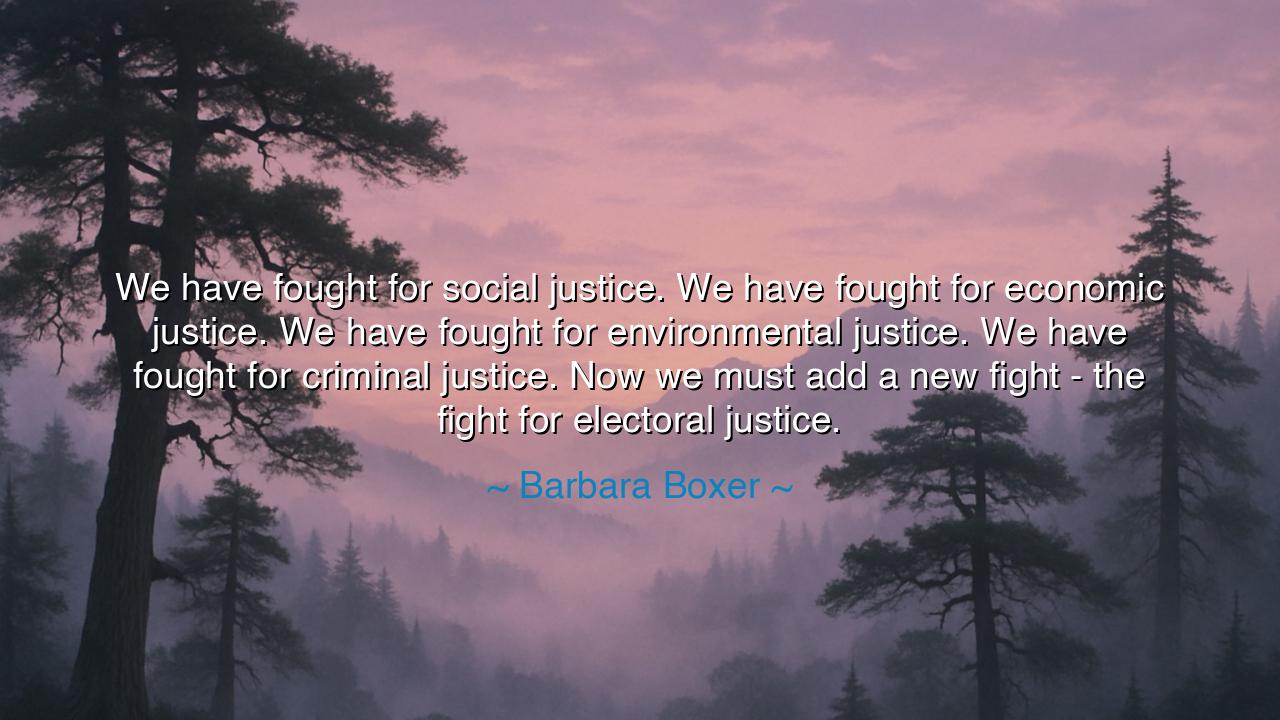
We have fought for social justice. We have fought for economic
We have fought for social justice. We have fought for economic justice. We have fought for environmental justice. We have fought for criminal justice. Now we must add a new fight - the fight for electoral justice.






When Barbara Boxer declared, “We have fought for social justice. We have fought for economic justice. We have fought for environmental justice. We have fought for criminal justice. Now we must add a new fight — the fight for electoral justice,” she was not merely speaking of politics, but of the sacred rhythm of democracy itself. Her words echo like the trumpet of an ancient herald, calling a weary yet determined people to one more battle — not for conquest, not for riches, but for the soul of freedom. For in her wisdom, Boxer recognized that when the fairness of the vote is threatened, every other victory — social, economic, or environmental — begins to crumble like sand in the wind.
The origin of this declaration comes from Boxer’s long years in the halls of American government, where she served as a United States Senator and a fierce advocate for justice. She witnessed the hard-fought gains of the 20th century — civil rights, women’s rights, environmental protections, and the expansion of opportunity — and she also saw how fragile those gains could be when the foundation of fair representation faltered. Her cry for “electoral justice” arose amid growing concerns over voter suppression, gerrymandering, and the erosion of public trust in the democratic process. To her, justice in every form — social, economic, and environmental — depends upon one thing above all: the ability of every voice to be heard and every vote to be counted.
The ancients would have understood this truth well. The philosophers of Athens, the cradle of democracy, taught that the strength of a polis — a city-state — did not lie in its walls or wealth, but in the participation of its citizens. When the voice of even one free person was silenced, the harmony of the whole society was broken. The Roman Republic, too, fell not because of lack of brilliance, but because power became concentrated in the hands of a few, and the people lost faith in the fairness of their institutions. Boxer’s call for electoral justice is thus not a modern invention, but a timeless plea that reaches across centuries: to preserve the integrity of governance, the covenant between ruler and ruled must remain sacred.
Consider the story of the civil rights movement in America — a struggle not only for dignity and equality, but for the simple, profound right to vote. When John Lewis, a young man of courage, marched across the Edmund Pettus Bridge in Selma, Alabama, he faced batons and blood for daring to claim what democracy had promised him. His body was beaten, but his spirit was not broken. The Voting Rights Act of 1965 was born from his pain and the courage of thousands like him. Yet Barbara Boxer’s warning reminds us that every right, once won, can be lost again if the people grow complacent. The fight for electoral justice is the fight to protect the inheritance bought by the suffering of the brave.
Boxer’s words are also a mirror to our age — an age where information is power and power can be manipulated. She understood that injustice in the ballot is the quietest tyranny, for it steals the will of the people not with violence, but with deceit. Whether through disinformation, barriers to voting, or corruption in representation, the enemies of fairness adapt with cunning subtlety. Thus, the battle for electoral justice is not fought on a single field, but everywhere — in the courts, in the legislatures, in the hearts of citizens who must remain vigilant against the creeping shadow of apathy.
In this sense, electoral justice is not merely a political goal; it is a moral duty. It demands of every person a commitment to truth, transparency, and participation. For if a people allow their elections to be warped by greed, division, or fear, they lose more than a government — they lose their unity, their trust, and their future. The ancients warned that freedom is like fire: it must be tended, or it dies. Boxer’s words rekindle that flame, reminding us that democracy is not a gift handed down by rulers, but a living covenant maintained by citizens who care enough to defend it.
The lesson is this: justice is one fabric woven from many threads, and when one thread is torn, all begin to unravel. To protect the poor while neglecting the vote is folly; to guard the planet while surrendering the polls is self-defeat. Every act of justice begins and ends with representation — with the sacred moment when a person stands before the ballot box and declares, “My voice matters.”
So, my children, take this wisdom to heart: guard the vote as you would guard your breath. Stand against those who seek to narrow it, distort it, or silence it. Teach your children that freedom is not inherited but renewed with every generation. For when the people fight not for privilege but for principle — not for power but for fairness — then the republic stands eternal. And in that endurance lies the truest form of justice: a world where every voice, no matter how small, shapes the destiny of all.






AAdministratorAdministrator
Welcome, honored guests. Please leave a comment, we will respond soon